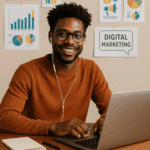In the ever-evolving world of digital marketing, new tools and techniques are constantly being introduced. It can be overwhelming for marketers to keep up with the latest trends and technologies. However, there are some digital marketing tools that every digital marketer should be using in 2023 to stay ahead of the competition. In this article, we’ll discuss the top 5 tools every digital marketer should have in their toolkit.

Table of Contents
- Introduction
- Tool 1: A/B Testing Software
- Tool 2: Marketing Automation Software
- Tool 3: Social Media Management Platform
- Tool 4: SEO Analysis Tools
- Tool 5: Google Analytics
- Conclusion
- FAQs
Tool 1: A/B Testing Software
A/B testing is an essential part of any digital marketing campaign. It allows marketers to test different versions of their website or landing pages to see which version performs better. A/B testing software like Optimizely or Google Optimize can help marketers run these tests easily and effectively. With these tools, marketers can create different versions of their websites or landing pages and test them against each other. The software will track which version performs better and provide insights into why one version is more successful than the other.
Optimizely:
is one of the popular A/B testing software that allows marketers to test different versions of their websites or landing pages. It uses a drag-and-drop editor, making it easy for marketers to create different versions of their websites without any coding knowledge. The software also provides real-time reports and analytics to help marketers understand the performance of each version.
Tool 2: Marketing Automation Software
Marketing automation software allows marketers to automate repetitive tasks and workflows, such as email marketing campaigns or lead nurturing. It can save time and resources while improving the effectiveness of marketing efforts. Tools like HubSpot or Marketo provide a range of features, including email marketing, lead management, and analytics.
HubSpot
A comprehensive marketing automation software that provides features like email marketing, lead management, and analytics. It also offers tools for social media management, content management, and CRM. With HubSpot, marketers can automate their marketing tasks and workflows and track the performance of their campaigns in real time.
Tool 3: Social Media Management Platform
Social media has become a crucial part of any digital marketing strategy. Managing multiple social media accounts can be time-consuming, but with a social media management platform like Hootsuite or Sprout Social, marketers can manage all their social media accounts from one dashboard. These tools allow marketers to schedule posts, track engagement, and analyze performance across multiple social media platforms.
Hootsuite
is a social media management platform that allows marketers to manage multiple social media accounts from a single dashboard. It provides features like scheduling posts, social listening, and analytics. Hootsuite also offers a mobile app, making it easy for marketers to manage their social media accounts on the go.
Tool 4: SEO Analysis Tools
Search engine optimization (SEO) is a critical component of digital marketing. SEO analysis tools like SEMrush or Ahrefs can help marketers analyze their website’s SEO performance and identify areas for improvement. These tools provide insights into keywords, backlinks, and site health, helping marketers optimize their websites for search engines and improve their search engine rankings.
SEMrush
is an SEO analysis tool that provides insights into keywords, backlinks, and site health. It also offers features like site auditing, rank tracking, and competitor analysis. SEMrush can help marketers identify areas for improvement and optimize their websites for search engines.
Tool 5: Google Analytics
Google Analytics is a free web analytics service that provides valuable insights into website traffic and user behaviour. It can help marketers understand how users interact with their websites and identify areas for improvement. With Google Analytics, marketers can track website traffic, user behaviour, and conversion rates, among other metrics. It can also provide insights into where users come from and which pages are most popular.
Google Analytics
is a free web analytics service that provides valuable insights into website traffic and user behaviour. It can help marketers understand how users interact with their websites and identify areas for improvement. With Google Analytics, marketers can track website traffic, user behaviour, and conversion rates, among other metrics. It can also provide insights into where users come from and which pages are most popular.
Conclusion
In conclusion, there are many tools available to help digital marketers improve their campaigns and stay ahead of the competition. A/B testing software, marketing automation software, social media management platforms, SEO analysis tools, and Google Analytics are some of the essential tools that every digital marketer should have in their toolkit. By using these tools effectively, marketers can optimize their campaigns, save time and resources, and improve their ROI.
FAQs
- What is A/B testing, and why is it important for digital marketing?
A/B testing is a technique used to test different versions of a website or landing page to see which version performs better. It is important for digital marketing because it can help marketers optimize their campaigns and improve their ROI. - What is marketing automation software, and how can it help digital marketers?
Marketing automation software allows marketers to automate repetitive tasks and workflows, such as email marketing campaigns or lead nurturing. It can save time and resources while









Leave a Comment
You must be logged in to post a comment